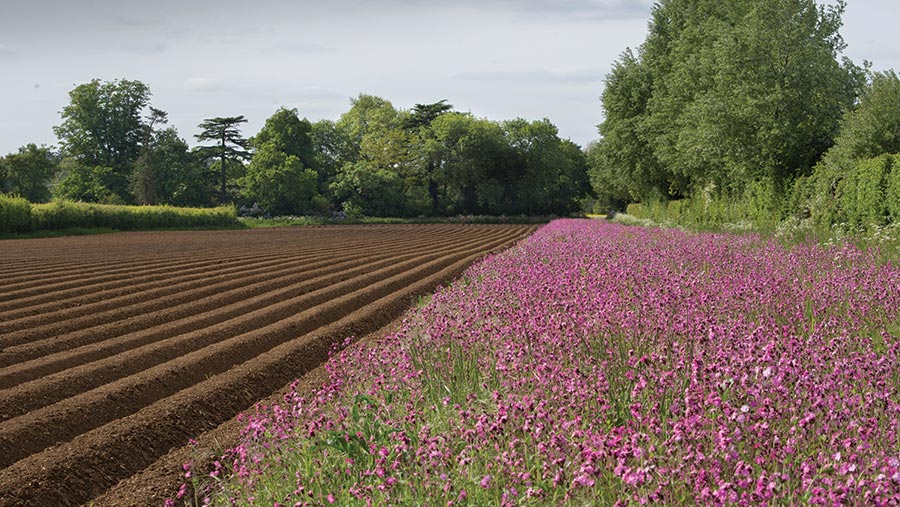Eustice responds to concerns on switch to new funding scheme
 © Tim Scrivener
© Tim Scrivener George Eustice has urged farmers to use Countryside Stewardship (CS) as a stepping stone to new agri-environment funding that he says will remove red tape and be tailored to individual needs.
The government’s subsidy shake-up will see direct payments phased out and replaced by a new system based on paying public money for “public goods”.
It will incentivise farmers who undertake work to secure better air and water quality, higher standards of welfare for animals and measures to curb flooding and mitigate climate change.
See also: Farming Carbon: How to make money from new woodland
The Defra minister reassured farmers they would be able to exit any CS scheme early without penalties when funding for the new Environmental Land Management (ELM) scheme is rolled out.
Speaking to Farmers Weekly on a visit to Malshanger Farm near Basingstoke, which has been in the Higher Tier CS since January 2018, Mr Eustice allayed concerns following the delay in some payments for schemes over the past two years.
“The Rural Payment Agency has done some sterling work to stabilise the situation to clear the backlog of payments,” said the minister.
Stewardship schemes: Key dates and how to apply
The application window opens on Tuesday 11 February and farmers and landowners can apply for the following schemes online or by contacting Rural Payments Service to request an application pack in the post:
- Mid-Tier – Agreement that delivers local environmental benefits. Apply by 31 May 2020
- Higher Tier – Agreement for more complex land in environmentally significant sites. Apply by 31 March 2020
- Wildlife offers – Designed to help guide farmers to the most straightforward options for their farm. Apply by 31 May 2020
- Hedgerows and boundaries – Grants for farmers to restore existing farm boundaries and hedgerows on their land. Apply by 31 March 2020
- Woodland support – Farmers and land managers can apply for woodland creation, management plan and tree health grants year round. Applicants can speak to their local Forestry Commission woodland officer to discuss these
“We have got the payment system back on an even keel, it is working normally again and that should not be something that puts farmers off.
“This year we have made close to 25% of payments already and we intend to give everybody their payment by June.”
Mr Eustice revealed that more than 30 trials for the ELM scheme were under way and he promised that the new system would leave “bureaucratic nonsense” behind.
A national pilot will be rolled out in 2021, with the scheme expected to be operational by the end of 2024.
He added: “We want something that is much more focused on human interaction, farmer to adviser, and a coherent plan that takes account of the particular set of circumstances on a given farm.
“We are testing this idea that you could have a trusted agronomist or farm adviser who visits the farm, sees what the potential is and then actually sits down around the kitchen table with that farmer and helps them put together a plan.”
Mr Eustice said it was too early to draw conclusions or results from the trials, but those involved “feel very excited” at the prospect of doing things differently.
“If we can dovetail some of those conventional principles of good farm husbandry with the best science and technology then we have the makings of a very exciting policy,” he added.
Case study: Malshanger Farm
The farm entered Higher Tier Countryside Stewardship on 1 January 2018.
The application was focused around a wildlife package of infield arable options, along with options that would contribute towards reducing nitrate entering the aquifer supplying water to Basingstoke.
Alongside the main cereals, the Colman family have been growing, harvesting and distilling 40ha of peppermint for almost 30 years.
The peppermint oil is then used for several products, including chocolates and teas.
Lavender (40ha) and camomile (20ha) is also grown and exported.
These rare arable plants helped turn the application into the higher tier.
Ian Margetts, estate manager at Malshanger Farm for nearly 40 years, said environmental principles have always been key to the way they farm.
On the incoming ELM scheme, he sounded a positive note: “On paper, it is underpinned by good farming practices, which is something the Colman family have always been passionate about.”
